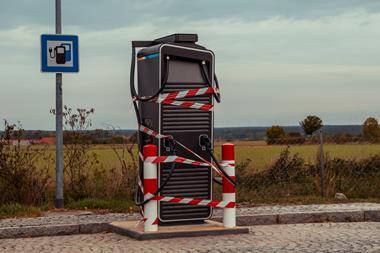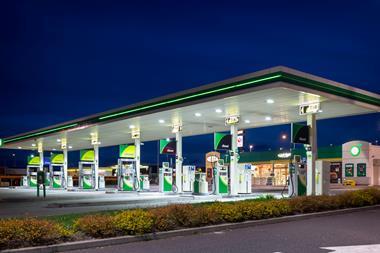BP customers in the UK can expect to access BP Chargemaster chargers rolling out at scale on forecourts over the next 12 months, on both company owned and dealer channels. David Newton, chief operating officer at BP Chargemaster told delegates at last month’s Forecourt Trader Electric Track Day that the company’s aim was to manage the energy transition and changing customer demand by supporting opportunities for customers to reduce their emissions.
"BP Chargemaster and BP believe that to accelerate the adoption of EVs, customers will require convenient access to fast and ultra-fast charging," he said. "And we believe our retail network is well positioned to provide this access."
He said the move to electric mobility was a significant challenge and potentially a threat to the existing forecourt business, and needed careful thought by the industry as to how it would be achieved.
"Collaboration is key," he said. "We will work pro-actively with the independent dealer community to develop mutually beneficial offers and propositions which will meet consumer demand for now, and for the future."
However, he agreed that not all sites would be immediately suitable for charging the challenges of parking, power provision and emerging consumer demand meant there was a "need to work collaboratively with our partners to develop solutions which manage latency and commercial effectiveness".
A key priority for BP Chargemaster will be the rollout of ultra-fast charging infrastructure, including 150kW rapid chargers capable of delivering 100 miles of range in 10 minutes.
Newton was one of several speakers at the event held at the Rockingham Motor Speedway Circuit in Corby which included a morning conference chaired by motoring journalist and TV presenter Quentin Willson; networking, exhibition and driving activities, focused on key elements of the electric vehicle market.
future transport is electric
There’s no doubting the future of transport is electric, according to Jonathan Tudor, director, technology and innovation strategy, Centrica Innovations. Centrica claims UK leadership in EV charging installations and operations, with a full range of end-to-end EV charging services and "a deep understanding of the technical and commercial challenges that come with delivering these projects", he said.
"We are helping forecourt owners transition to be part of the EV revolution. In recent years we’ve installed Tesla’s supercharging network Ecotricity, so we’re very familiar with how you install this type of equipment."
He said the company had been wrestling in the past couple of years to really understand where the opportunities are going to grow; the timescales over which it’ll start to become material; and to answer many of the questions forecourt retailers may have - such as what will the impact be on their businesses.
An owner of two electric vehicles, including a Tesla, Tudor was understandably evangelical about electric technology he believes range anxiety exists in people who don’t own electric vehicles "you make it work!". But having worked at BP until a year ago, understood that the EV revolution posed both a threat and an opportunity for independent forecourt owners.
"The question at BP was, how does the company still make a margin by selling lasagne, prosecco and bread not fuel? The same question you’ll be asking yourselves..."
Tudor stressed that declining demand for petrol and diesel will undermine conventional fuel sales, while simultaneously challenging revenue from adjacent retail operations, but mandates for EV charging at motorway service stations and some localised fuelling stations would present forecourt owners with an opportunity to remain part of the fuels value chain.
"The move to electric cars isn’t going to be something that happens overnight," he said. "By 2030, we expect every fifth new car sold globally will be an EV. It’s going to be a very slow transition, so you’re still going to have a lot of people with combustion-based vehicles needing to be served. But we believe the tipping point where EV adoption will start accelerating a bit faster is not that far off maybe two-to-three years max.
"At the moment in the UK the consumer has the choice of about 12-15 different electric car models. But in the next 18 months that’s going to jump up to 30 in total there will be 16 new models and a lot more in the lower end, with brands like Peugeot Citroen bringing in much more affordable models.
"Manufacturers are thinking about how they make these cars more affordable for the traditional Ford Focus-type customer," he stressed. "They’re thinking about how they change that business model."
"But I wouldn’t panic, there are options you can consider for sure, but there are only 130,000 electric vehicles on the road in the UK. There’s a big growth rate, but it’s still a relatively small number. The charging network is there and is about adequate for that number.
"But if the adoption of those vehicles outpaces and out-accelerates the rollout of the charging network, you’re going to start seeing a pinch point."
Meanwhile, Jamie Thompson’s message was clear electric charging on a forecourt can be extremely dangerous. And he should know. Thompson is chairman of the APEA’s Technical Committee, responsible for producing guidance for petrol station construction The Blue Book having spent 38 years as principal petroleum inspector for London, the largest petroleum enforcing authority in Europe. "The industry has always adapted," he said, but stressed electric charging on forecourts posed a difficult challenge, because of the extremely hazardous nature of petrol: "Electrics must be kept away from delivery and dispensing areas, or equipment designed to be used in a hazardous area such as tank gauges and petrol pumps. Electric chargers cannot be made safe to use in such areas."
He said it was a legal requirement to have hazard area drawings on all filling stations which would clearly indicate where not to install electric charging. But this would mean that some sites will be too small to safely install an EV charger.
Thompson also warned of a high risk of explosions when the hazardous area is linked to the non- hazardous area by ducts, which are not properly sealed. He advised retailers wanting to install EV chargers to use reputable installers with Compex qualifications, and to seek advice from their Petroleum Enforcing Authority.
"It is cheaper than getting it wrong and having a prohibition notice issued on the site."



























No comments yet